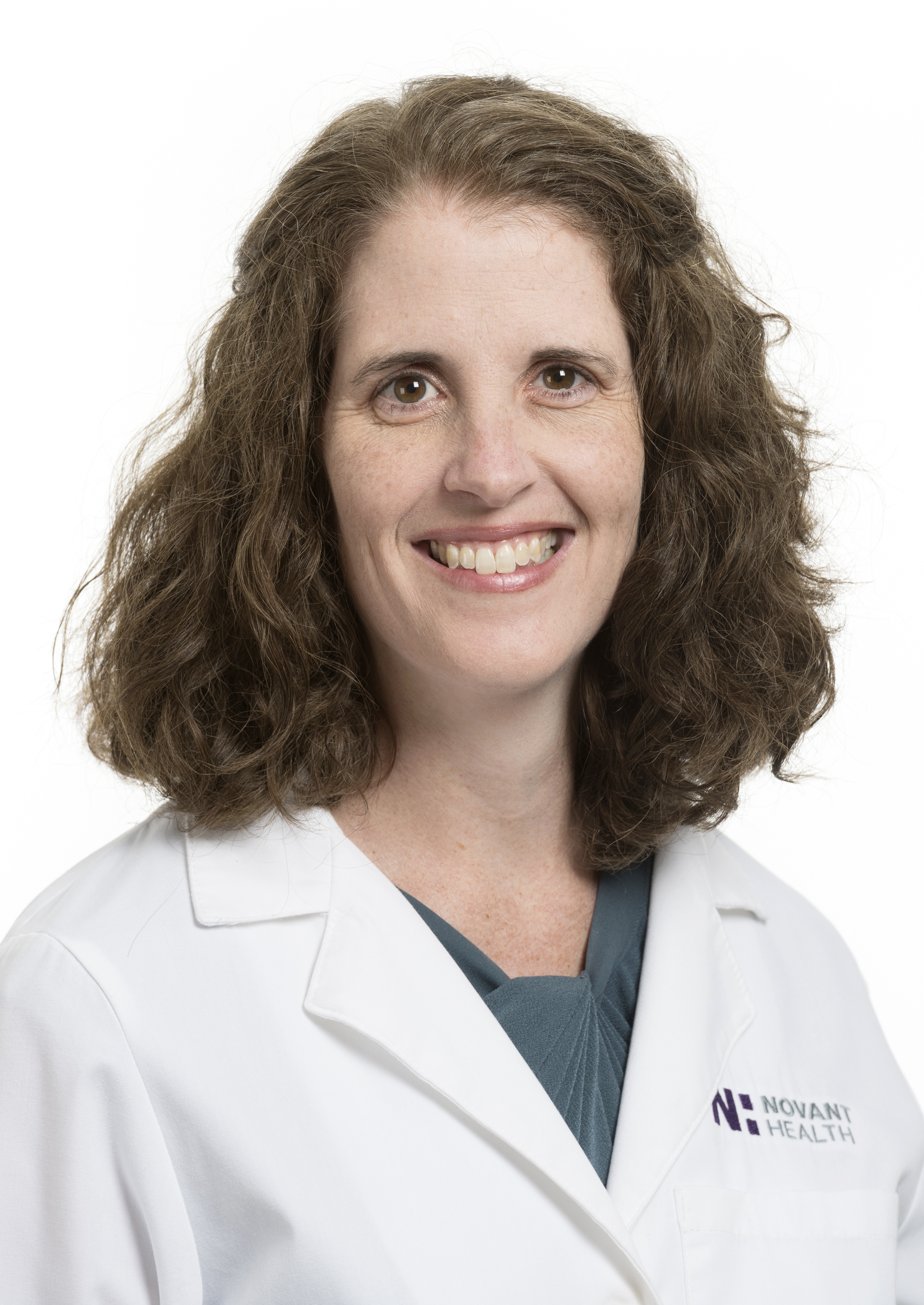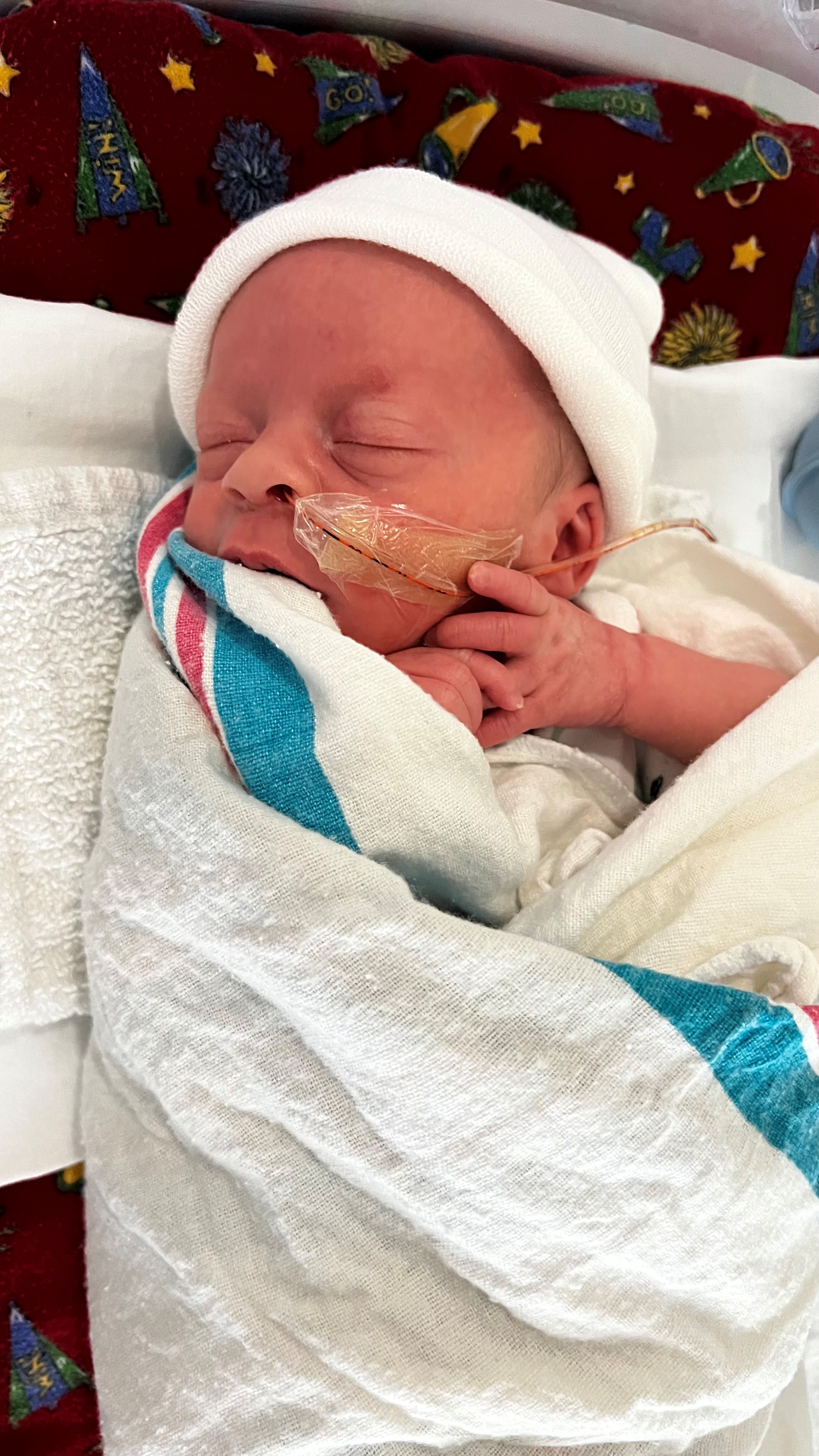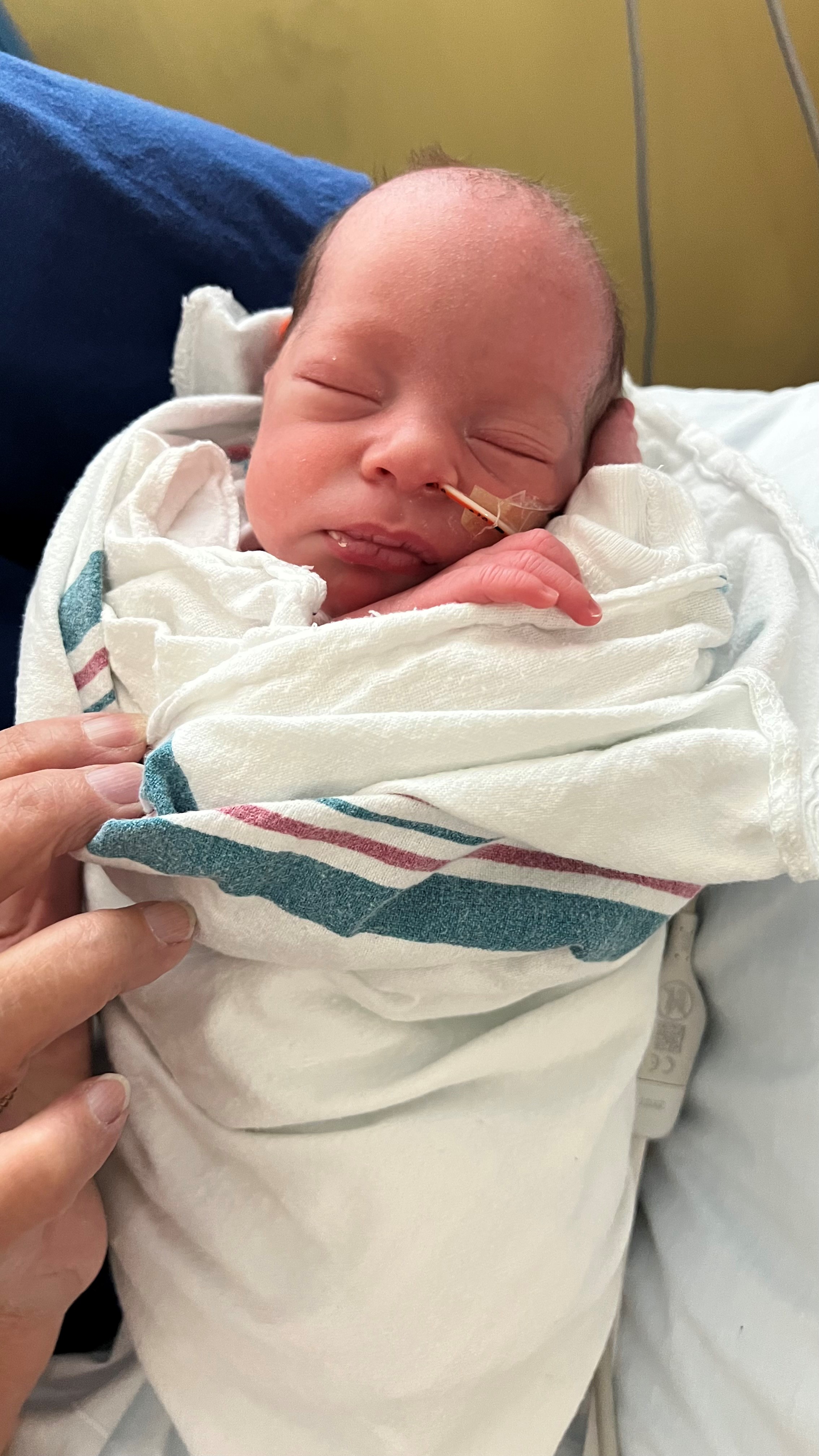When Shawna MacDowell, 31, and her fiancé, Justin Thompson, decided to have a child, they were thrilled to get pregnant almost immediately. MacDowell’s daughter would “finally” be a big sister. Thompson, 35, would be a first-time dad. And it would be the couple’s first child together. So, they were all excited to jump into new roles.

But they weren’t ready for what happened next. At their first doctor’s visit, an ultrasound tech counted not one – or even two – but three, separate fetuses.
In what might be a bit of an understatement for most parents, “It was a lot to take in,” MacDowell said.
Multiple births (delivering twins, triplets or more) is common with fertility treatments. But the couple conceived naturally.
Spontaneous triplets are rare, occurring in 1 in almost 7,000 pregnancies. Other data puts the chances even lower, with naturally occurring triplets occurring in 1 in 10,000 pregnancies.
They were excited about bringing three more children into the family. But it also meant they faced more risks. To ensure the healthiest outcome possible, MacDowell was referred to maternal fetal medicine (MFM).

An MFM specialist is an ob-gyn doctor with advanced fellowship training in the diagnosis and management of complications in women and their unborn babies.
They complement, but do not replace, the care provided by an ob-gyn like MacDowell’s provider, Dr. Mark Bland of Novant Health Rankin OB/GYN – Randolph.
Caring for a high-risk pregnancy

“That first visit, in particular, is really educational, as well,” Ausbeck said. "We discuss the potential risks and complications, with options on how to manage them."
Gestational hypertension, high blood pressure in expecting women, can develop into preeclampsia, for example. Preeclampsia affects the arteries carrying blood to the placenta, which can lead to slow growth known as fetal growth restriction.
Left untreated, preeclampsia can lead to serious – even fatal – complications for both mother and baby, so early delivery of the baby is often recommended. Other health risks include:
- Gestational diabetes, a type of diabetes only pregnant women can get.
- Postpartum hemorrhage, heavy bleeding at the time of delivery.
- Miscarriage or stillbirth.
- Preterm labor and premature birth.
- Birth defects such as spina bifida and cerebral palsy.
McDowell learned next that carrying higher-order multiples (triplets or more) placed her at even higher risk. Some women opt to manage that risk by reducing their pregnancy to twins or singleton (one baby).
“Complications tend to increase with each additional fetus, so we always have those conversations early,” Ausbeck said.

Whether you are pregnant, hoping to become pregnant or just need a checkup, our ob-gyns are here for you.
She ‘lucked out’ with Dr. Ausbeck
At Novant Health, MFM does not assign patients to a particular doctor. Instead, they see whoever is working the day of their visit.
MacDowell said she “lucked out” in that Ausbeck seemed to be there nearly at nearly every appointment. They instantly established a rapport.
“She’s great,” MacDowell said. “She’s one of the best, most optimistic doctors I’ve ever worked with. And she made me feel really comfortable every step of the way.”
Living with a high-risk pregnancy often means navigating a lot of uncertainty. For starters, MacDowell didn’t have a due date, which was difficult for the self-described planner.
“I can totally sympathize with that because I am the same way,” Ausbeck said. “I’m ‘Type A.’ I’m also a mother who has had a high-risk pregnancy, so I understand what it’s like to come to terms with the fact that it doesn’t always go as planned.”
A team of experts

MacDowell’s ob-gyn provided her prenatal care – things like routine lab work, weight management and physical exams – while MFM monitored for other conditions such as preeclampsia and gestational diabetes and hypertension.
“We can’t prevent these altogether,” Ausbeck said, "but a low dose of aspirin, taken daily, can help reduce risk.” Should one develop, maternal fetal medicine decides how to treat it.
MFMs also:
- Determine the best time to deliver as mom gets closer to term.
- Identify how many placentas there are, known as chorionicity, preferably in the first trimester.
Here’s why: Multiples who share placentas need additional monitoring because they have the highest risk of complications. The Thompson triplets were “lucky,” however, in that each had their own placenta.
One of ‘the best’ in maternity care
A minivan for her birthday

Meantime, MacDowell and Thompson prepared the nursery and checked other to-do items off their list. That meant finding a stroller (and a vehicle) that could fit triplets.
“We weren’t going to be able to fit all the kids in the car, so I got a minivan for my birthday this year,” she said.
They also chose baby names. MacDowell’s 7-year-old daughter, Scarlett, inspired the couple to “go with a color theme.” Knowing they were having three girls, they settled on Hazel Jean, Navy Grey and Sage Ann.
Both parents were thankful to work at companies that allowed them to take parental leave. MacDowell is a patient flow coordinator at Novant Health, and her fiancé works at Legion Brewery in Charlotte.
Breastfeeding multiples
Then there was that question of whether or not to breastfeed three babies at one time. Thankfully, she’d have the support of Novant Health’s international-board certified lactation consultants.

Breastfeeding triplets is “absolutely possible,” said Laura Corsig, manager of lactation services in Charlotte and a lactation consultant herself. But what they define as successful breastfeeding may look a little different.
“The last thing we want to do, especially with triplets, is make it seem like tripling your milk supply would be easy, breezy,” she said. “Because it’s not.”
Let’s say mom makes enough breast milk for one or two babies, but not enough for three. Breast milk for babies is like healthy eating for adults, so any amount is still good.
“If your body made and gave birth to triplets, your body is working beautifully," Corsig said. "We give babies what breast milk mom has, fill in the gaps with formula and we redefine that as successful breastfeeding for moms of multiples."
36 weeks
MFM played a crucial role in determining when MacDowell would deliver. The goal for triplets is 36 weeks, but she’d deliver sooner if complications developed.
“When we think about timing of delivery, we want to find a gestational age that strikes a balance of not delivering the babies too soon and risk prematurity, while not extending the pregnancy too long, which can increase mom's risk of preeclampsia and stillbirth,” Ausbeck said.
Not only would MacDowell deliver via cesarean section, chances were good her triplets would spend their first days of life in the Neonatal Intensive Care Unit, the highest level of acute care for newborns.“Any child born before 35 weeks will come to us, because they have an increased risk for complications,” said nurse manager Phyllis Waddell, who’s spent 40 years caring for NICU babies at Novant Health.
Neonatal Intensive Care Unit
The NICU would set up three stations at delivery, one for each newborn, along with three care teams to take vitals and perform resuscitation.
“We’d have a nurse, respiratory therapist and either a doctor or nurse practitioner assigned to each baby,” Waddell said. “Once the neonates are stable, they come back to the nursery where they get round-the-clock care.”
NICU newborns are monitored by board-certified neonatologists (doctors who specialize in the care of newborns), registered nurses and nurse practitioners. Team members also provide education and emotional support.
“Every member of the family is our patient. And as you build relationships, you build trust," Waddell said. "That's so important for families who leave us, total strangers at first, with their most prized possessions. But I don’t think it takes long for them to realize we have the best interest of these babies at heart.”
Oct. 11, 2022
Around 32 weeks, MacDowell developed preeclampsia, a known potential complication with multiple gestations. Doctors couldn’t get her blood pressure under control, so she delivered on Oct. 11, 2022.

Navy weighed in at 4 lbs. 8 oz., Hazel was 4 lbs. 2 oz. and Sage trailed just slightly behind at 4 lbs. exactly. Each little one appeared to be healthy, but they went to the NICU. You’ll remember, Waddell said any baby born before 35 weeks will end up there.
While they were monitored for complications, mom was experiencing quite a few of her own.
“Shortly after my C-section, I experienced postpartum hemorrhage, so they took me back into the operating room. And after several unsuccessful attempts to stop the bleeding, doctors made the decision to do an emergency hysterectomy to save my life,” MacDowell said.
By the end of surgery, she’d lost “close to 90%” of her blood which doctors replaced with a blood transfusion. After a night in the Intensive Care Unit at Novant Health Presbyterian Medical Center, MacDowell was stable enough to meet her girls.
And they all got stronger as the weeks ticked by. Hazel went home Oct. 30, Navy left a day later and Sage completed the trio when she left the NICU on Nov. 12.
Three times the love
The Thompson triplets are thriving as they settle into life at home. “They’re doing great,” MacDowell said. “All three have gained weight. They can hold up their heads. And two have already learned how to roll themselves over. They're incredibly alert, too. People are surprised to learn how old they are.”
Thompson is “adapting incredibly well” to being a dad, while Scarlett loves being a big sister. "She reads to them and picks out their outfits," MacDowell said.
And she's already back to work, saying her manager, Katie Prater, “has been amazing and tries to accommodate me in any way she can.”
Also amazing, MacDowell said, are the lactation consultants who went above and beyond. “As I recovered from surgery, they came to the ICU and pumped for me when I was too weak. They were extremely supportive. And they continued to check on me even after the girls were discharged.”
Breastfeeding takes practice and patience. We can help.
Accredited as a Baby-Friendly USA Hospital, Novant Health offers both virtual and in-person opportunities to get help with breastfeeding.
Learn the proper techniques and boost your confidence at Novant Health Breastfeeding. With locations across North Carolina, our lactation consultants want your nursing experience to be a successful one. Other services include prenatal assessments, prenatal breastfeeding classes, back-to-work appointments, certified bra-fitters, breastfeeding supplies and much more.
Pregnant and breastfeeding mothers can connect with a lactation consultant and other new parents at Novant Health’s Baby Café. Read about a first-time mom’s experience. Or click here for a list of locations.
Two new classes, added in 2022, help support mothers of multiples. This includes Breastfeeding After a high-Risk Pregnancy and Breastfeeding Multiples. All classes are virtual – and typically free, though insurance coverage can vary. Bookmark their calendar of events for a complete list of virtual classes.


















